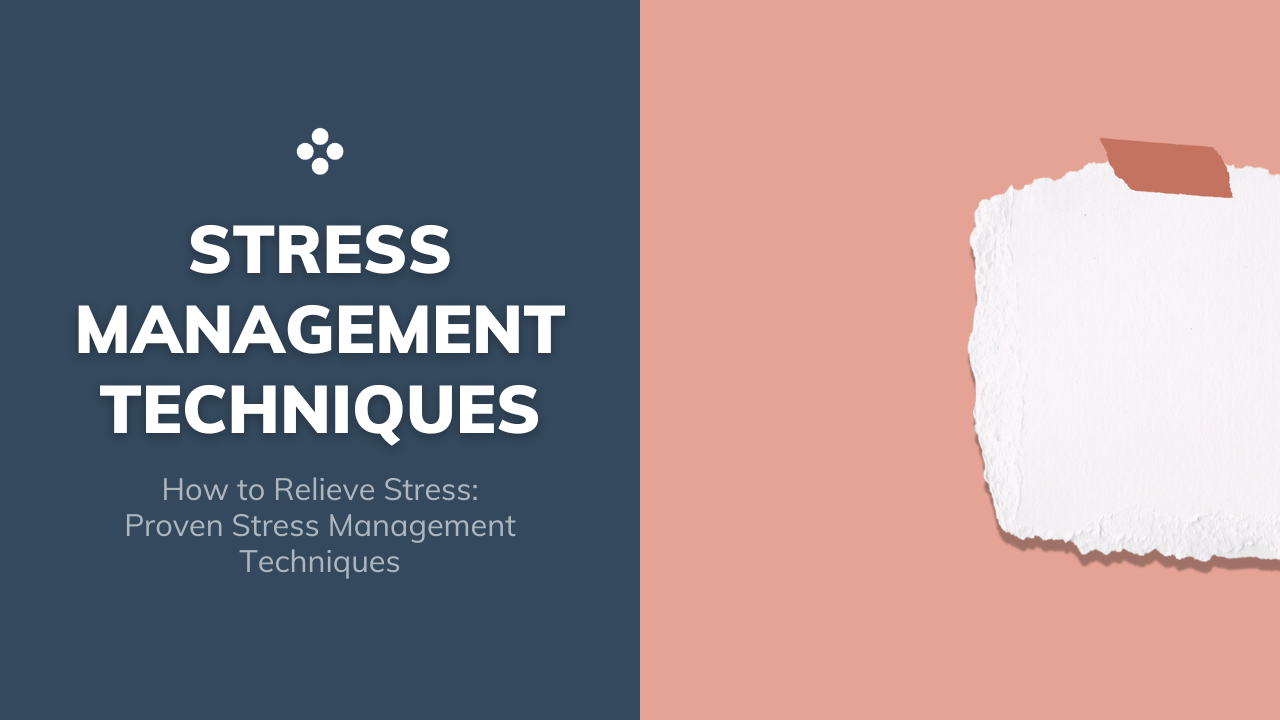How to Relieve Stress: Proven Stress Management Techniques

Stress is a normal part of life. In fact, if you didn't ever feel stressed, I'd argue you're either a zombie or on a high dosage of something you'd be better off without.
But that said, make no mistake, without learning to manage stress, it can soon turn into a serious problem, especially when it becomes overwhelming or chronic.
When stressed, our bodies release hormones that can have a negative impact on both our physical and mental health.
Understanding the connection between your thoughts, emotions, and stress levels can be a game changer when wanting to manage stress more effectively.
Why?
Because your thoughts about a situation can have a big impact on how you feel emotionally, and your emotions can then lead to increased stress levels.
Yes, it’s a cyclical thing – a cycle you’ll want to break to have any chance of maintaining your overall wellbeing and relationships.
So, in this article I'll share a number of proven stress management practices, which can be used to help you manage stress more effectively from day to day.

Mindfulness techniques for stress management
Mindfulness is the practice of paying attention to the present moment without judgement.
When being mindful, you’ll be able to observe your thoughts and emotions without getting caught up in them.
And this will help you with seeing them for what they are – nothing more, nothing less. Simply thoughts and emotions, not facts.
A few helpful mindfulness techniques which can help you observe your thoughts and feelings and evaluate them in healthy ways, include:
- Labelling
- Reframing
- Acceptance
- Gratitude
In taking a look at each in little more detail, you'll be able to give attention to where you may already be practising them in some way shape or form.
Equally, you'll also be able to consider where applying them on a day to day basis might go a long way in helping you to manage your stress better.
Labelling
Labelling means doing what it says on the label, being aware of when you notice a thought and taking a moment to label it.
If it sounds a bit complicated, let me give you a couple of examples.
One example of labelling might be saying something like, "I'm having the thought that I'm going to fail my driving test."
Another might be saying to yourself, “I’m having a thought that I’m depressed.”
Labelling helps to put some distance between yourself and the thought or emotion you’re observing, so you can see it for what it is.
Creating space enables you to evaluate your thought or emotion objectively, allowing you to challenge its validity and consider its potential impact.
Reframing
Having ‘labelled’ your thought or emotion, you can then reframe it.
Put differently, you can find a more healthy (or positive) way to think about your situation.
In the first example you might say something like, "I'm feeling anxious about my driving test, but I know I've had lots of lessons, my instructor believes I’m ready, and I'm going to do my best."
For the second example you might say to yourself, “I’m struggling with depression, but I know I have some helpful ways of improving my mood which I can do whenever I need to.”
Acceptance
Unfortunately, it’s not always possible to change or adapt a negative or unhealthy thought or emotion into something more constructive.
Truth is, on occasion they can be persistent. And no matter how hard you try, they’re more resilient and overwhelming than a petulant toddler.
And it’s in these cases, just as you would a toddler, that it's important to practise acceptance.
In other words, learning to acknowledge your thought or emotion without judgement and simply allowing it to be there.
An example of what this might sound like is saying something like, "I'm having the thought that I'm going to fail my driving test, and that's okay. I can still focus on doing my best."
Gratitude
When exhausted from trying to fight off your negative thoughts or emotions with no success, you can try a different tactic… gratitude.
Practising gratitude involves shifting your focus away from the thoughts or emotions causing your concern, towards positive aspects of our life.
For example, you might consider taking just a few minutes each evening to note down three things you're grateful for.
Family, friends, and Häagen-Dazs will always make my list!
Anyway, giving attention to the things in your life that you’re grateful for can not only help to improve your mood, but reduce your stress levels too.
Mindfulness techniques have a number of other benefits. One worth noting is that they can help calm your amygdala – the part of your brain responsible for activating your stress response.

Cognitive techniques for stress management
When stressed, my brain has a tendency to run on overdrive. It’s annoying, and there’ve been countless times when I’ve wished I had an off switch or shut down option like my MacBook Pro.
However, I’m not a machine. And it’s impossible for me to simply shut down or switch off when things are on my mind and stress has the better of me.
But fortunately, this is where cognitive techniques to manage stress come into play.
Cognitive techniques are a set of practical strategies you can use to challenge your negative thoughts, and any underlying beliefs which might be fuelling them.
For example, if weighed down with a thought that you're going to fail your driving test, you could ask yourself the following:
- Is this thought actually true?
- What evidence do I have to support my thought?
- What are other possible explanations for the situation?
In observing and challenging your negative thoughts, you’ll start to see them for what they are. Just thoughts.
Although it isn’t always immediately obvious (which is why learning to label them is important), thoughts are not facts.
Understanding the fact that not all thoughts are reflective of reality, will help you feel less stressed and more in control of your emotions.
Some cognitive techniques for managing stress include:
- Challenging negative thoughts
- Identifying catastrophic thinking
- Using soothing self-talk
- Problem solving
If you want to know where to start with your efforts to improve the way you manage stress, these are good places to begin.
Challenging negative thoughts
When noticing or observing a negative thought, the first thing to do is ask an enquiry question, such as, “Is this true?”, or “What evidence supports this?”
Enquiry questions help to separate you from your thoughts, provide scope to evaluate them objectively, and decide on whether they serve you well or not.
Identifying catastrophic thinking
It’s not uncommon to hear people painting the worst-case scenario about a situation.
In fact, I’d suggest there’s always at least one person within every relational context – family, friendship group, or colleagues – whose world is about to end.
But no judgement here, I’ve noticed myself adopting this pattern of thinking far too often. Especially during periods when I’ve felt overwhelmingly stressed.
As you’ve probably worked out, catastrophic thinking is simply having a tendency to believe the worst possible outcome will happen.
Similarly to negative thinking, when you catch yourself entertaining catastrophic thoughts, ask enquiry questions and remind yourself that it is not necessarily true.
Soothing self-talk
In the same way a loving parent speaks to their child, soothing self-talk is the practice of talking to yourself in a kind, compassionate, and supportive way.
Being harsh and overly critical of your thoughts, emotions or actions, won’t help in any way to move beyond the challenges causing your stress.
Instead, when feeling stressed, bring to mind your strengths and abilities, and tell yourself you’re capable of handling the situation.
Problem solving
When stressed about a problem, the only thing that’ll ultimately fix the problem, besides it going away, which isn’t always possible, is to solve it.
Facing problems head on is the best and most effective way to manage your stress. By contrast, despite it being tempting, burying your head in the sand is the worst thing you could possibly do.
Acceptance and action will always trump denial and disengagement.
That said, a few questions to ask yourself when you’ve decided to problem solve to help reduce stress, might include things like:
- What is the actual problem?
- What are the possible solutions?
- What are the pros and cons of each solution idea?
- How might each solution be implemented?
- What might I need?
- Who might be able to help me?
Answering these questions can make you feel a ton better, because they’ll highlight where you have a degree of control over your situation.
They’ll also go a long way in helping you solve the problem at hand. So once you’ve answered them, the only thing left to do is to take action.

Other stress management techniques
Besides being more mindful and trying some of the cognitive techniques mentioned, there are a number of other things you can do to manage stress including:
- Regular exercise
- Sleeping routine
- Eat healthy
- Social support
- Relaxation
Though you might be more tempted to neglect these more commonly known stress management techniques, it's probably not such a good idea.
Exercise regularly
You’d have heard it a thousand times over… “exercise is a great way to reduce stress and improve your mood.”
Physical activity not only helps regulate your stress hormones, it activates the release of feel-good hormones like endorphins, oxytocin, dopamine and serotonin.
In fact, one study found exercise to be as effective as antidepressants for those with depression.
Just 30 minutes of moderate to vigorous physical activity five days a week is considered enough. That’s the equivalent of just two and half hours over a week.
Sleeping routine
When deprived of sleep, your body is more likely to release stress hormones into your body.
These hormones – cortisol and adrenaline – are designed to make you more alert to danger, so it's understandable that unmanaged stress can cause you to experience a sleepless night or two.
Along with other stress management techniques, developing a consistent sleeping routine, consisting of 7-8 hours per night, will help you combat stress.
Eat healthy
You don’t have to be a gourmet chef to eat a healthy diet. And for that I personally thank God, because eating well can help to improve mood and reduce stress.
I’m not a nutritionist, but from what I understand it’s important to avoid processed foods, sugar, saturated fat, sugar, and excessive amounts of alcohol and caffeine.
Opting instead for fruit and veg, and whole grain foods like oatmeal, quinoa, and brown rice. Food high in protein such as fish, lean red meats, and nuts. And of course, lots of water.
Social support
Spending time with others can help to reduce stress. And whether you’re an introvert or extrovert, social support is good for providing a sense of belonging and connection.
But another thing that makes having a network good for managing stress, is the reality that you’ll have people to call on when needed for both emotional or practical help.
Relaxation techniques
Relaxation techniques, such as deep breathing, meditation, and yoga, are all proven to be helpful in reducing levels of stress.
I know from conversations with my clients they’re not for everyone. Especially in cases where there remains stigma about what it means to manage stress as a man.
But over time, what I’ve found for myself and those who’ve tried them, is they do have their benefits.
Yet despite them being good for calming your body and reducing overthinking and anxiety, you’ll never catch me in a pair of psychedelic yoga pants…
Unless it’s for charity, of course!
Summary
Your ability to manage stress is vital to maintaining your physical and mental health.
Being clued up on the links between your thoughts and emotions and how they affect your stress levels shouldn’t be overlooked.
Learning to practise both mindfulness and cognitive techniques to manage stress more effectively can be a helpful first step.
Of equal importance are other disciplines like regular exercise, getting enough sleep, eating a nutritious diet, and maintaining healthy relationships.
I should also add that if you’re struggling to manage stress on your own, getting help from a trained professional is something you might also want to consider.
Sources
How to manage stress with mindfulness and meditation
Exercise is an all-natural treatment to fight depression
How to look after your mental health using physical exercise
Social Support for Stress Relief
Relaxation Techniques for Stress Relief
Photo credits
